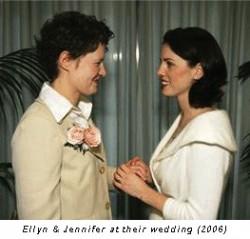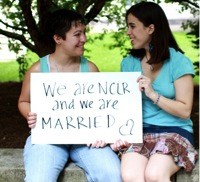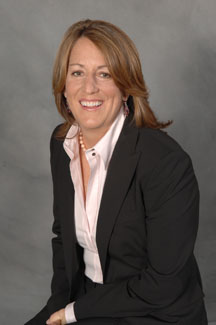Out for Justice: September 2011
A Physician’s Perspective on New Nationwide Hospital Guidance
Widow Defends Her Marriage Against Challenges by Deceased Wife’s Parents
NCLR Represents Sixth Student in Case Against Minnesota’s Anoka-Hennepin School District
So Much to Celebrate
It’s been a busy—and exciting—summer in our movement, which took a significant leap forward last week with the demise of “Don’t Ask, Don’t Tell.”
Last Tuesday’s historic repeal doesn’t just mark the end of the 18-year-old policy, it signals a new era in which government policies that discriminate based on sexual orientation and gender identity are rightly seen as shameful and outmoded.
So much blood, sweat, and tears have gone into the repeal, from the service members who have lived in the shadow of discrimination to the countless organizations that have worked so hard every day, never giving up hope that one day gay, lesbian, and bisexual soldiers could serve openly. (And now we must work to stop discrimination against transgender people in the military as well.)
That’s a lot to celebrate, but as the old Ronco commercial says, “but wait, there’s more!” Every day we continue working to advance full equality for every member of our diverse lesbian, gay, bisexual, and transgender community across the country through litigation and policy work, with this summer being one of our busiest.
You may have heard that we’re representing a widow fighting to be recognized as her wife’s surviving spouse. In this case, which is one of the most disturbing we’ve ever seen, our client Jennifer Tobits lost her wife of four years to a rare and aggressive form of cancer. Before Jennifer could even begin to mourn the loss of her loving spouse, she found herself having to fight for their marriage to be recognized by her in-laws, who want to deny that their daughter was a lesbian and married a woman.
Here at NCLR we know all too well that Jennifer’s story isn’t rare. Neither are the daily struggles faced by the students in Minnesota’s Anoka-Hennepin School District, where we filed two lawsuits this summer challenging a policy that prevents staff from addressing LGBTQ issues and that has exacerbated the bullying and harassment faced by many LGBTQ students in the district.
Ebonie is the latest student to join the lawsuit against Anoka-Hennepin. She had the courage to come out as a lesbian when she was just 12 years old, and had the support of her school and classmates until she transferred to a new middle school in Anoka-Hennepin. There, she was tormented from day one, with her peers hurling derogatory names and insults at her, bumping into her in the hallways, punching her in the stomach, and calling her “he/she.”
Even as we rightfully celebrate the progress achieved last week, there is still so much more work ahead. And we’re proud and honored to stand beside each of you as we fight, never giving up hope that one day we will all celebrate our full equality and freedom from discrimination.
In solidarity,
A Physician’s Perspective on New Nationwide Hospital Guidance
By Dr. Patricia Evans, M.D.
When my patients are sick and in the hospital, I’ll do everything in my power to take care of them. I want them to do well, and patients often feel best and do better when their families and friends are close.
Patients need the security of knowing that if they can’t advocate for themselves, they get to decide who can make the decisions for them. And every doctor knows that some of the most important care that patients can get while in the hospital is from those who are truly close to them.
Earlier this month, the U.S. Department of Health and Human Services (HHS) released new guidance for hospitals that improve regulations released by the department nearly a year ago.
Here’s what these rules will mean for my patients and for people hospitalized in any state in our country: security during the most vulnerable times of their lives.
This guidance does three main things:
- First, it allows a patient who is competent to choose a surrogate decision-maker and requires hospitals to honor that choice, even if the person had previously designated someone else.
- Second, it prohibits a hospital from requiring proof of a relationship in order to respect that relationship.
- Finally, where a patient is incapacitated and a dispute arises concerning who the proper patient representative is, these rules empower hospitals to resolve that conflict by considering who the patient would be most likely to choose to be their representative. It directs the hospital to consider factors such as the existence of a marriage, domestic partnership, or civil union, a shared household, or any special factors that show that a person has a special familiarity with the patient and the patient’s wishes.
Previously, health care providers were sometimes compelled to choose between following the heath directives of a life partner and those of a traditional primary relative. These rules will give patients the security and peace of mind that comes from knowing that if and when they are unable to make decisions for themselves, they can choose who will speak for them and that hospitals will respect their chosen families and friends.
I appreciate NCLR’s advocacy and this guidance clarification provided by HHS. When patients are sick, that is when they need help and protection the most. This guidance gets it right for patients: respect for chosen family and friends, a nationwide policy that puts the power to decide into patients’ hands and greater protections for LGBTQ people.
Read NCLR’s FAQ on the new HHS guidance.
Dr. Patricia Evans, M.D., is a family physician who resides in Maryland.
Widow Defends Her Marriage Against Challenges by Deceased Wife’s Parents

In Pennsylvania, Ellyn’s parents have challenged Jennifer’s right to be treated as Ellyn’s surviving spouse and to receive death benefits from Ellyn’s employer, a law firm. Ellyn’s parents have claimed that the law firm cannot recognize same-sex spouses in their own benefits plan—a private contract—because of the federal Defense of Marriage Act (DOMA) and Pennsylvania’s mini-DOMA statute. The federal trial court for the Eastern District of Pennsylvania is hearing the case.
In Illinois, Ellyn’s parents have tried to take over the administration of Ellyn’s estate, which would give them additional power to continue to try and erase Ellyn and Jennifer’s marriage and invade their privacy.
Jennifer should not have had to spend the entire first year after losing her wife fending off attacks by Ellyn’s parents. But NCLR is proud to stand beside her, helping fight for her relationship, and working with dedicated and skilled co-counsel in both cases. In Pennsylvania, Jennifer’s counsel team includes Ben Jerner, Tiffany Palmer, and Rebecca Levin of Jerner & Palmer P.C., and Teresa Renaker, Julie Wilensky, and Nina Wasow of Lewis, Feinberg, Lee, Renaker & Jackson, P.C. In Illinois, NCLR is joined by Dan Ebner and Ray Prather of Prather Ebner LLP, and Elizabeth Deeley, Sarah Piepmeier, and Dmitriy Tishyevich of Kirkland & Ellis LLP.
We will continue to stand with Jennifer until her marriage to Ellyn receives the full respect it deserves.
NCLR Represents Sixth Student in Case Against Minnesota’s Anoka-Hennepin School District

No one at that school hassled her about her sexual orientation or non-gender conformity, but all that changed when her family moved and she transferred to Jackson Middle School for her eighth grade year. Jackson is in the Anoka-Hennepin School District—Minnesota’s largest school district with more than 38,000 students, in the suburbs 20 minutes north of Minneapolis. The taunts started the very first day she walked through her new school’s doors, with classmates staring, pointing, and hurling degrading insults at Ebonie, who often wears baggy pants, oversized t-shirts, and her hair pulled back in braids. They taunted her with names like “dyke,” “it,” and “he-she” nearly every day, with the insults growing vulgar and violent as students purposefully bumped into her in the hallways. One student even punched her in the stomach after calling her a “he-she.”
Ebonie is the latest student to join the lawsuits filed this summer by the National Center for Lesbian Rights against the Anoka-Hennepin School District, where a policy prevents teachers from addressing lesbian, gay, bisexual, and transgender issues, which contributes to the hostile anti-LGBTQ atmosphere in the district.
“It’s just wrong. No one should be harassed like that just because of who they are,” said Ebonie, who just started ninth grade at an Anoka-Hennepin high school. “It was even worse because the school acted like it wasn’t a big deal and treated me like I was the problem. I felt really angry and sad all the time. By the end of the year, I pretty much stopped going to school.”
Like the other five students involved in the lawsuits, Ebonie—referred to as “E.R.” in the lawsuit—turned to her teachers and school administrators repeatedly, but far too often nothing was done to stop the bullies from tormenting her. Instead, Ebonie was left to struggle on her own, with district staff frequently either ignoring the harassment or responding with, at most, a weak “knock it off.”
On one occasion, a student scrawled anti-LGBTQ slurs on a class binder that included Ebonie’s upcoming assignments and homework. When Ebonie told the teacher, the school administrators took the binder away—keeping it for about two weeks despite her repeated requests—resulting in her being unable to complete much of her classwork until she eventually received a replacement.
Each of the students involved in the lawsuits experienced similar treatment in schools across the district. Despite the painful experiences they have endured, the students and their families are hopeful that the lawsuit will lead to improved school district policies and training that will protect other kids from the kinds of harm and discrimination that they went through.
Ebonie is represented by NCLR and the law firm of Culberth & Lienemann, LLP. Her attorneys are working closely with the Southern Poverty Law Center and Faegre & Benson, LLP, who are co-counsel with NCLR in the companion case of Doe v. Anoka- Hennepin School District No. 11.
Want to be in a NCLR Promo?
Want to be in a promo for NCLR? We would like to invite you to take part in our “I am NCLR … ” photo campaign, designed to reflect and showcase our clients and supporters who fight alongside us everyday to ensure that every LGBTQ person can live with dignity and security.

The best images will be used in NCLR promotional and marketing material through our 35th anniversary event on May 5, 2012, where we will showcase many of your photos to help tell NCLR’s story through real images, from real people.
We have already received a number of great photos, and will be using them for upcoming promotions.
Support NCLR through eScrip

How about using eScrip?
What is eScrip? It’s a simple way for you to support NCLR at no cost to you. All you have to do is register your credit/debit cards and ATM cards with eScrip—then any time you use one of them to shop with a participating merchant, the merchant will donate up to 8% of the purchase amount to NCLR. That’s right: you pay for only what you’re buying, and the store is the one who donates. Perfect!
NCLR’s Group Name: “National Center for Lesbian Rights” or “NCLR”
NCLR’s Group ID #: 500022336
Over 150 merchants at which you already shop participate, including Whole Foods, Wild Oats, Andronico’s, Mollie Stone’s, Bristol Farms, Working Assets, Sharper Image, Round Table Pizza, Chevron, OfficeMax, Budget Rent-A-Car, Payless Shoes, Orchard Supply Hardware, and many more. Check out the full list of participating merchants.
Register with eScrip online now! Under “Make a difference in 4 easy steps,” click on “Sign up, it’s free!” Your credit card information will only be used for this purpose and is guaranteed to be safe and secure.
Shop at NCLR’s Store













